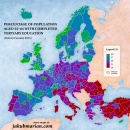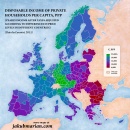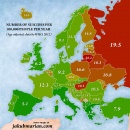 |
‘Inhabited’ or ‘inhabitated’ in English
Long story short, the correct form is inhabited. The reason why people (especially non-native speakers) tend to think that the word is (...)
September 25, 2016 – Jakub Marian – English
|
 |
Difference between “float”, “swim”, and “sail” in English
Non-native speakers of English sometimes incorrectly say that a non-living thing, such as a boat or a piece of wood, “swims in the water” (...)
September 23, 2016 – Jakub Marian – English
|
 |
Definition of ‘cousin once removed’ in English
Two people are “first cousins once removed” when their relationship is that of first cousins plus one generation. In particular, this (...)
September 16, 2016 – Jakub Marian – English
|
 |
Percentage of population with completed tertiary education by region in Europe
As the job market for unqualified workforce shrinks, more and more people realize that completed secondary (high school) education no (...)
September 14, 2016 – Jakub Marian – Maps
|
 |
Disposable income (PPP) per capita by region in Europe
Disposable income is defined as income (from employment, business, property, or social security) minus taxes and social security (...)
September 12, 2016 – Jakub Marian – Maps
|
By the way, have you already seen my brand new web app for non-native speakers of English? It's based on reading texts and learning by having all meanings, pronunciations, grammar forms etc. easily accessible. It looks like this:
 |
Suicide rates by country in Europe
People from Nordic countries have a reputation for being suicidal, but the data by WHO (World Health Organization) from 2012 show that (...)
September 8, 2016 – Jakub Marian – Maps
|
 |
Origin of the phrase “Roger that” in English
Roger that or usually simply Roger (nowadays also often spelled in lower case) is a phrase used in aviation and the military to confirm (...)
September 7, 2016 – Jakub Marian – English
|
 |
Difference between ‘anybody’ and ‘anyone’
Short answer: “Anyone” and “anybody” mean the same, perhaps with one exception. Long answer: Some authors ascribe slightly different (...)
September 5, 2016 – Jakub Marian – English
|
 |
Stress position and accents in Italian
Stress placement in Italian is variable, just like in English (the stressed syllable changes from word to word). However, Italian has (...)
|
 |
‘Orient’ vs. ‘orientate’ in English
The noun Orient comes from Latin oriens, which means “east”. The word was introduced into English as a general designation for countries (...)
August 30, 2016 – Jakub Marian – English
|
